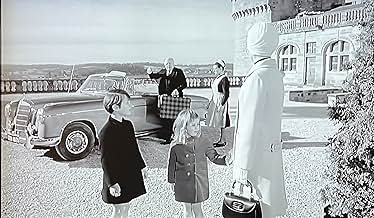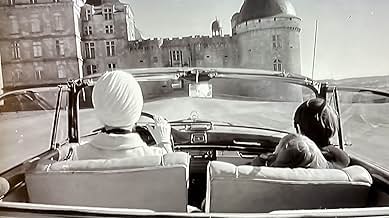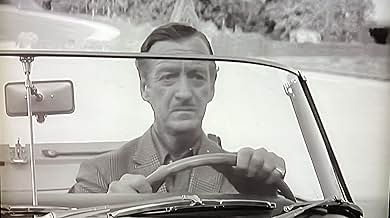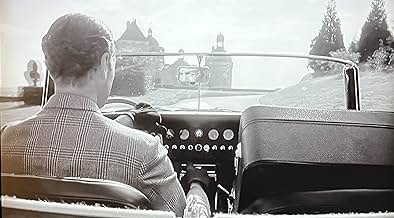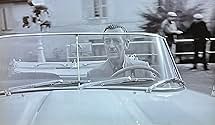IMDb RATING
6.1/10
3.6K
YOUR RATING
Workers employed at a French vineyard quietly follow old pagan rituals that call for the life of the marquis owner to save his crops during dry seasons.Workers employed at a French vineyard quietly follow old pagan rituals that call for the life of the marquis owner to save his crops during dry seasons.Workers employed at a French vineyard quietly follow old pagan rituals that call for the life of the marquis owner to save his crops during dry seasons.
Chris Adcock
- Villager
- (uncredited)
Hyma Beckley
- Villager
- (uncredited)
Olwen Brookes
- Party Guest
- (uncredited)
Featured reviews
This one gets a least a 7 just on the camera work: glorious black & white, lots of shadowy scenes shot in a creepy French castle. Add to the mix a gorgeous young Sharon Tate in her screen debut as a freekoid Pagan witchess and you have enough to hold my attention for 90 minutes! I thought it was great all the way around: story line, casting, sets, you name it. Lots to like: Pagan cults, weird ceremonies with dead doves, hooded figures dressed in black, a tomb in the woods, ritual sacrifice, and did I mention that the magnificent Sharon Tate is in this movie? David Niven is outstanding as the grim and proper heir to a cruel pagan tradition designed to save the failing vineyards of his fore fathers. Ignore the IMDb 5.5 average rating -- if you like 60's B&W British creepy chiller/thrillers, watch it!
"Eye of the Devil" had a very troubled history. Kim Novak was originally cast as the female lead, but production had to be shut down as she proved inadequate to the role's demands (surprise!) and was let go.
The film is about a French nobleman (played by David Niven) who's family fortune is tied to a small village that makes wine. He's called back to the family chateau as the vineyards have been failing for a few years, an announcement ripe with sinister and mysterious overtones. He tells his wife (Deborah Kerr) not to follow him or bring their two children, but soon she does just that, fearing for his safety.
What follows involves ancient pagan rituals, witchcraft, and deadly family secrets that go back centuries and can be handed down to the next generation.
There's a nice thriller in here somewhere, and director J. Lee Thompson manages some creepy scenes here and there. Best are the scenes with a manipulative and hostile Sharon Tate and/or David Hemmings, and one where Kerr is menaced by a group of hooded figures in the woods. Also the ending is properly disturbing.
But for the most part, the film's atmosphere is gloomy and dank, which kills the suspense. It doesn't help that both Deborah Kerr and David Niven are both too mature at this point to be playing parents of small children. Niven looks mostly distracted and Kerr, while capable in her damsel-in-distress role, does a less interesting variation on her brilliant performance in "The Innocents," though in that case the role was far more complex. As for the late Ms. Tate, I'm convinced her voice was dubbed by another actress, but she does cut a very provocative figure.
The film contains too many characters, and not all the plot makes much sense. This is strictly something for British horror fans to watch out of curiosity, or for devotees of Deborah Kerr.
The film is about a French nobleman (played by David Niven) who's family fortune is tied to a small village that makes wine. He's called back to the family chateau as the vineyards have been failing for a few years, an announcement ripe with sinister and mysterious overtones. He tells his wife (Deborah Kerr) not to follow him or bring their two children, but soon she does just that, fearing for his safety.
What follows involves ancient pagan rituals, witchcraft, and deadly family secrets that go back centuries and can be handed down to the next generation.
There's a nice thriller in here somewhere, and director J. Lee Thompson manages some creepy scenes here and there. Best are the scenes with a manipulative and hostile Sharon Tate and/or David Hemmings, and one where Kerr is menaced by a group of hooded figures in the woods. Also the ending is properly disturbing.
But for the most part, the film's atmosphere is gloomy and dank, which kills the suspense. It doesn't help that both Deborah Kerr and David Niven are both too mature at this point to be playing parents of small children. Niven looks mostly distracted and Kerr, while capable in her damsel-in-distress role, does a less interesting variation on her brilliant performance in "The Innocents," though in that case the role was far more complex. As for the late Ms. Tate, I'm convinced her voice was dubbed by another actress, but she does cut a very provocative figure.
The film contains too many characters, and not all the plot makes much sense. This is strictly something for British horror fans to watch out of curiosity, or for devotees of Deborah Kerr.
Curiously solid, little occult psychological thriller that's sinisterly gloomy and consists of a banged-up ensemble cast featuring names like David Niven, Deborah Kerr, Donald Pleasance, David Hemming and Sharon Tate. A wealthy French nobleman returns back to his home town, along with his wife and children to help out with the town's failing vineyard. When there he tries to keep it secret from his wife, but she soon discovers the family tradition of Pagan sacrifice . The professionally classy performances are fitting, especially the support roles with Hemming and Tate really embellishing a creepy presence. Same for a cold-glazed Pleasance. Director J. Lee Thompson's atmospheric touch shows in many frames of this crisp b/w presentation, from the spooky castle, to the watching townsfolk and a disorientating chase scene through the castles nearby forest. It's attractively photographed, where Thompson also goes about providing some frenetic camera angles to lay out the anxiety of the circumstances. Despite some short-lived pockets, tension seems to be replaced by glum atmospherics in what feels like a slow-burn mood piece with a stringently compounded script breathing plenty of mystery and intrigue from that dark secret formula. Some things are not entirely explained, but it gives in to a devilish ending, but it's a very long build up to its foreseeable payoff. Some motions and actions of Kerr's concerned, but caring mother figure were somewhat an irritation. Niven is fine as the man tormented by his ancestral responsibilities, but it doesn't ask too much from him. While Kerr was the opposite with her emotive turn. The music score is melodically haunting in its angelic cues. A wickedly sleepy black mass thriller.
"Drive out of this valley. Never come back.".
"Drive out of this valley. Never come back.".
Historically speaking this film serves as an invaluable precursor to Anthony Shaffer's ingenious THE WICKER MAN, starring Edward Woodward and Christopher Lee. Taken on its own, however, EYE OF THE DEVIL is an effective but wildly uneven film.
The story deals with a wealthy French nobleman (David Niven) who is called back to his ancestral castle when the crops fail. Due to his erratic behavior regarding this summons, wife Deborah Kerr becomes increasingly worried about Niven's safety. Against his orders, Kerr takes her children to his ancestral castle, where she witnesses many strange and eerie religious rites. The question then becomes, will Kerr be able to rescue Niven from a ritual sacrifice, and -- indeed -- does he wish to be saved?
Owing to its erratic production history, it's not surprising that EYE OF THE DEVIL is a bit rough around the edges. The story is obtuse, and the characters under-developed, but director J. Lee Thompson employs an intriguingly arty approach that keeps one alert throughout. Thompson makes excellent use of Ernest Haller's mobil camerawork, most notably in a memorable race-against-the-clock climax. Additionally, the score is excellent, and the cast is well above average for this sort of thing. In the lead roles, Kerr and Niven are effective and restrained, but it is the supporting cast that really impresses: Donald Pleasence, his head shave completely bald, as a sinsiter cleric; David Hemmings as a seemingly evil youth; and especially Sharon Tate as Hemmings' enchantingly sensual/wicked sister.
In the end, EYE OF THE DEVIL cannot be considered a great film. It is, however, an above average diabolical thriller, and as such can be recommended to horror fans. My rating: *** out of ****
The story deals with a wealthy French nobleman (David Niven) who is called back to his ancestral castle when the crops fail. Due to his erratic behavior regarding this summons, wife Deborah Kerr becomes increasingly worried about Niven's safety. Against his orders, Kerr takes her children to his ancestral castle, where she witnesses many strange and eerie religious rites. The question then becomes, will Kerr be able to rescue Niven from a ritual sacrifice, and -- indeed -- does he wish to be saved?
Owing to its erratic production history, it's not surprising that EYE OF THE DEVIL is a bit rough around the edges. The story is obtuse, and the characters under-developed, but director J. Lee Thompson employs an intriguingly arty approach that keeps one alert throughout. Thompson makes excellent use of Ernest Haller's mobil camerawork, most notably in a memorable race-against-the-clock climax. Additionally, the score is excellent, and the cast is well above average for this sort of thing. In the lead roles, Kerr and Niven are effective and restrained, but it is the supporting cast that really impresses: Donald Pleasence, his head shave completely bald, as a sinsiter cleric; David Hemmings as a seemingly evil youth; and especially Sharon Tate as Hemmings' enchantingly sensual/wicked sister.
In the end, EYE OF THE DEVIL cannot be considered a great film. It is, however, an above average diabolical thriller, and as such can be recommended to horror fans. My rating: *** out of ****
Okay spooker is missing some important back-story that would make it more compelling. Niven is disengaged in the lead, leaving a slackness to the main thrust of the movie but Deborah Kerr is suitably panicked as the questioning wife. What a supporting cast though! Flora Robson, Edward Mulhare, Emlyn Williams all contribute little bits of color and Donald Pleasance is ideally cast as an ominous presence who keeps popping, up his liquid eyes betraying nothing but giving the viewer the creeps nonetheless. David Hemmings has little to do but stare into the distance and give off an unpleasant vibe which he does well while being disturbing in his beauty. Speaking of beauty, this was Sharon Tate's first big role in her regrettably short career and she gets the corresponding introducing credit , man alive was she breathtaking! She gives an appropriate performance all glacial looks and dreamy line readings, the part doesn't demand more than that. But the camera loved her and when she's on screen you look at no one else, a vital component of a star. Would she have achieved that position? Who knows but the ingredients where definitely there. The black & white photography is most evocative and was a wise choice to set the proper tone for the piece. Not a great film by any means but a decent view near Halloween.
Did you know
- TriviaThis movie spent a long time on the shelf. Filming was completed in the early part of 1966, but its American release was not until late 1967, and its British one not until the spring of 1968. David Hemmings made this movie before his breakthrough role in Blow-Up (1966), and it is quite possible that the great (and unexpected) popularity of that movie was what finally pushed MGM into releasing this one. Many commented with surprise on the smallness of Hemmings' role - it is likely that his special billing, along with that of Sharon Tate, was an afterthought to disguise the fact that they had supporting parts. Although this movie was supposed to launch Tate, she had, because of its protracted shelf-life, already been seen in Don't Make Waves (1967), which she had made subsequently. That movie has a special "introducing" credit for her as a result.
- GoofsDavid Niven's character, Philippe, goes to a vineyard to inspect grapes, wearing a blazer with a button-down oxford underneath. After a cutaway scene to a different character, the view returns to Philippe in the vineyard. He is still wearing the same oxford but now he has a covering sweater-vest on instead of the blazer.
- Quotes
Philippe de Montfaucon: Believe it, Catherine.
Catherine de Montfaucon: I just told you, I don't!
Philippe de Montfaucon: Believe it. Believe it. Believe it. Or leave here.
- Crazy creditsThe Turner print has the main title as "Eye of the Devil" but the ending credit lists the title as "13".
- Alternate versionsThe "Turner" print uses "Eye of the Devil" as the main title; but, the end credit lists the title as "13". This print has a running time of 95 minutes.
- ConnectionsEdited into Inside the Manson Gang (2007)
Details
- Release date
- Countries of origin
- Language
- Also known as
- Die schwarze 13
- Filming locations
- Château de Hautefort, Dordogne, France(castle-exteriors)
- Production company
- See more company credits at IMDbPro
Box office
- Budget
- $3,000,000 (estimated)
- Gross worldwide
- $4,966
- Runtime
- 1h 36m(96 min)
- Color
- Aspect ratio
- 1.66 : 1
Contribute to this page
Suggest an edit or add missing content


